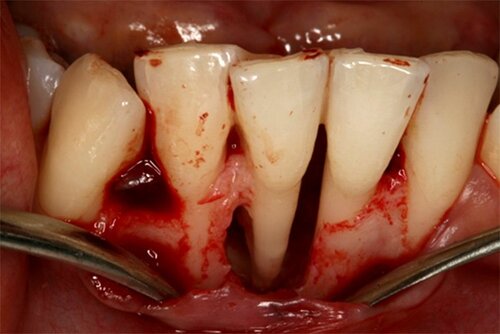![]()
22 June 2018
In the spotlight at EuroPerio9: latest research on impact on periodontal health of oral piercings, psychological health, and sports performance

The potential negative effects of oral piercings on periodontal health were highlighted in the third and final EFP press conference at EuroPerio on Friday 22 June.
The conference also featured presentations on associations between psychological health and gum diseases, on the impact of oral health on sports performance, and on the changing role of the healthcare team.
Clemens Walter (University of Basel, Switzerland) presented research that showed how tongue piercings may affect gums and teeth that are in close proximity to them.
“My interest in piercings began when a young female patient presenting unusually severe periodontal destruction was referred to my clinic,” explained Dr Walter.
“The patient was periodontally healthy with the exception of the lower incisor teeth. We could not identify any known risk factors. The patient had a tongue piercing. Non-surgical and advanced surgical treatment was performed and was not successful. The patient lost teeth. Since then, I have been curious about this association and started to collect cases.”
Subsequent research found an association between oral piercings and increased periodontal inflammation, shown by increased bleeding on probing, probing depth, and attachment loss. The closer teeth were to a tongue piercing, the more affected they were.
“Acknowledging the growing data from all over the world, we now try to create awareness about the consequences of piercings for oral health and we counsel our patients to remove piercings in order to decrease the risk of dental and periodontal complications,” said Dr Walter.
An abstract presented at EuroPerio9 by Bernard Loir (Brussels, Belgium) on the same subject reports two case studies where young female patients had repeated gum damage caused by chronic pressure of the metal against the teeth and gums during tongue movements when speaking, eating, or swallowing. Tongue piercings were associated with gum bleeding and infection, causing deep lingual infrabony lesions and periodontitis.
Effects of depression and stress
Sebastian Jungo (Paris Descartes University, France) explained how depression and stress were associated with gum disease, urging periodontists to evaluate the psychosocial status of their patients.
He presented a study which found that psychosocial factors such as depression, stress, emotional vulnerability, and “Type A” personality were associated with more severe periodontal injuries.
“After controlling for age, tobacco consumption, and the form of periodontitis, we found that a clinical attachment loss of over 5mm was associated with ‘emotional vulnerability’ for all patients, and with stress and Type A personality in patients presenting aggressive periodontitis,” said Dr Jungo, who added that more research was needed into the possible causes of this association.
Gum health and sports performance
Ian Needleman (UCL Eastman Dental Clinic, London, UK) outlined findings that show how elite athletes’ performance is negatively impacted by oral disease.
He presented a cross-sectional study showing that elite athletes had significant levels of periodontal disease, with one third reporting that poor oral health impacted their performance negatively.
This study, conducted in 2016 before the Olympic Games in Rio de Janeiro, included 325 athletes from different sports including athletics, rugby, and football. Overall, 32% of athletes reported an oral-health impact on sport performance. Only 1.1% of the sample was found to be in “excellent” periodontal health, with 87.5% of athletes presenting half the mouth affected by gingivitis and 21.6% presenting periodontitis.
“Interestingly, 97% of the athletes that took part in this study said that they brushed their teeth twice a day and 40% said they cleaned between their teeth once a day,” observed Prof Needleman. “Compared to the results of the most recent national oral-health survey in Great Britain – where 75% of people said they cleaned teeth twice a day and 21% reported use of dental floss – athletes seem to be more health conscious and have better oral-hygiene habits than the general population.
“What is striking is that even though they report good dental hygiene, elite athletes still present oral-health issues and their periodontal health is not improved.”
Regarding the possible causes for the higher risk of oral diseases in athletes, Prof Needleman noted that nutrition in sports was heavily reliant on frequent carbohydrate intakes, which are known to increase inflammation in the body and gum tissues. Another cause may be that, in sports where there is a lot of airflow (such as cycling and running), breathing hard can make the mouth dry, so teeth lose the protective benefits of saliva.
Prof Needleman is developing a study on effective behaviour-change interventions and said that it was important to create awareness of the impact of oral health on elite sport and of the simple preventive measures that can reduce risk factors and improve performance.
Bruno Loos (University of Amsterdam, Netherlands) rounded off the press conference, with a presentation about the changing role of the oral-healthcare team and the increasing importance of collaborating with other medical specialities, notably with diabetologists, cardiologists, and oncologists.
He highlighted the debate about using the dental office to screen for early detection of major systemic diseases such as diabetes and cardiovascular disease. “Dental treatment is an added value for general health conditions – it can help reduce inflammation and impact glycaemic control,” explained Prof Loos.
The conference was chaired by Francis Hughes, who was chair of the organising committee for EuroPerio8, held in London three years ago.




